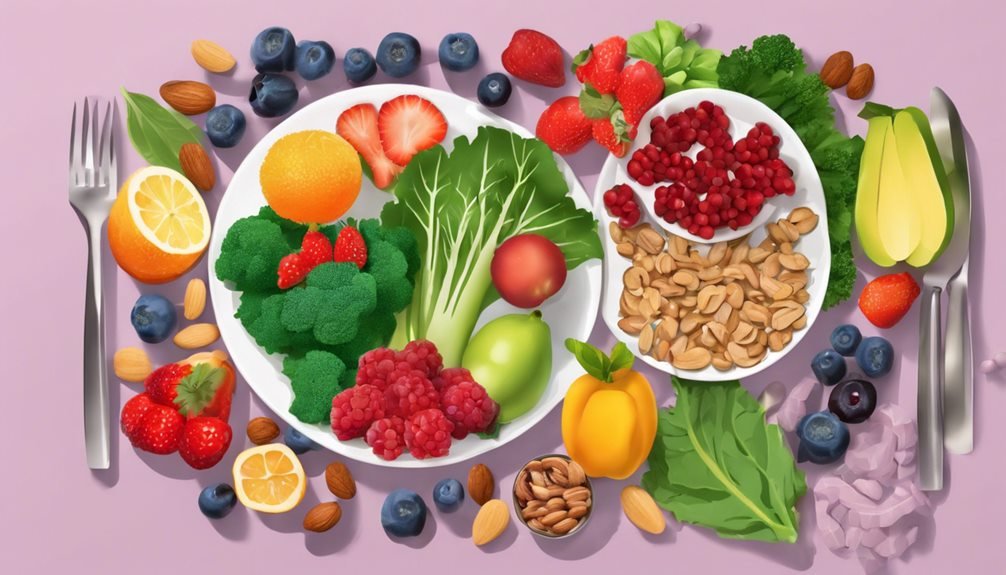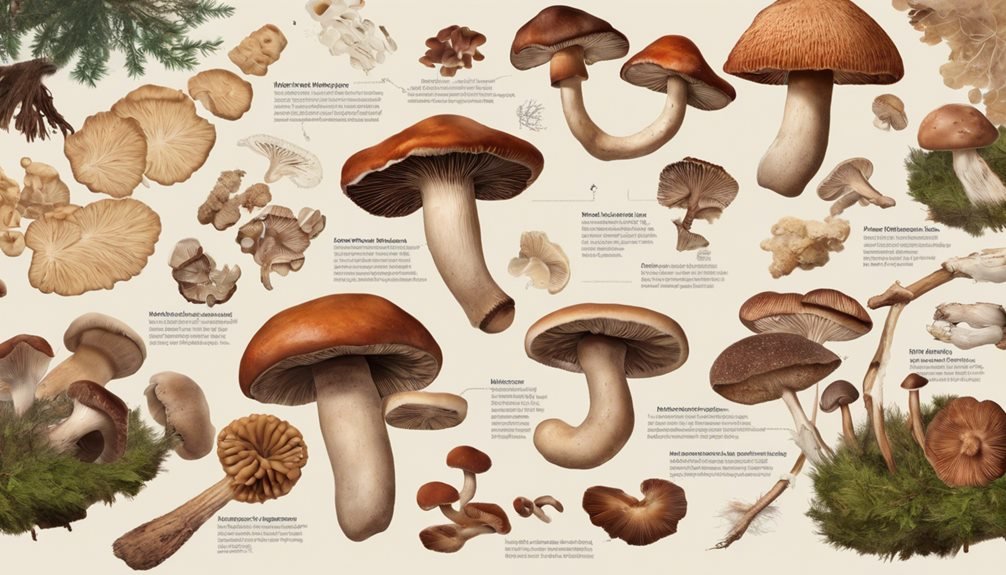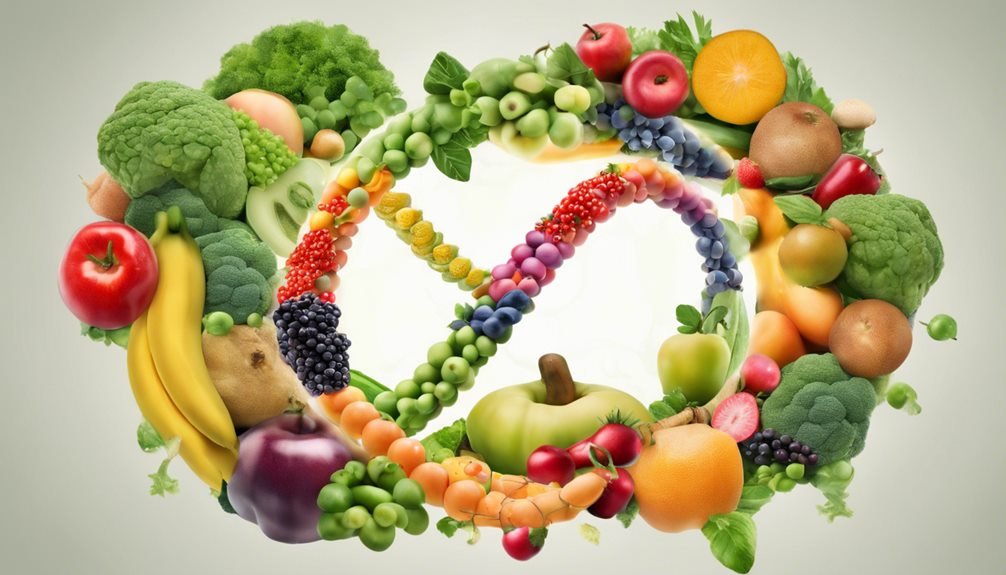As you consider ways to enhance your overall health and potentially reduce your risk of cancer, exploring the role of low-carb diets might offer intriguing insights. Imagine a dietary approach that not only focuses on fueling your body but also actively works against cancer development. The concept of manipulating your carbohydrate intake to influence cancer cell behavior is both fascinating and promising. By understanding the intricate mechanisms behind low-carb diets and their impact on cancer prevention, you might uncover a powerful tool in your journey towards wellness.
Key Takeaways
- Low-carb diets reduce insulin levels, inhibiting tumor growth.
- Ketogenic diets starve cancer cells by limiting carbohydrates.
- Protein intake supports immune response and cell repair mechanisms.
- Healthy fats reduce inflammation and protect cells from damage.
- Low-carb diets impact cancer cells' metabolism, growth, and signaling mechanisms.
Low-Carb Diets Overview
Low-carb diets, also known as low-carbohydrate diets, are dietary plans that focus on reducing the intake of carbohydrates while increasing the consumption of proteins and fats. These diets have shown various benefits, especially in weight management. By limiting carb intake, the body shifts to burning fat for fuel, leading to weight loss and improved metabolic health. Low-carb diets can also help regulate blood sugar levels, reduce cravings, and increase feelings of fullness, all of which contribute to better weight control.
In addition to weight management, low-carb diets have been associated with improved cardiovascular health, better blood pressure control, and reduced risk of type 2 diabetes.
The focus on whole, nutrient-dense foods in these diets can also provide essential vitamins and minerals that support overall health and well-being. By choosing high-quality sources of protein and fats, individuals following a low-carb diet can enjoy a balanced and satisfying way of eating that promotes a healthy lifestyle.
Carbohydrates and Cancer Risk
Reducing the consumption of carbohydrates and understanding their potential impact on cancer risk is a crucial aspect of overall health awareness. When it comes to carbs moderation and cancer risk, here are some key points to consider:
- Glycemic Index: Choosing carbohydrates with a lower glycemic index can help regulate blood sugar levels, potentially reducing the risk of certain cancers linked to high sugar consumption.
- Fiber Intake: Opt for whole grains, fruits, and vegetables rich in fiber. Adequate fiber intake from carbohydrates can aid in digestion and may lower the risk of colorectal cancer.
- Processed Carbs: Limit intake of processed carbohydrates like sugary snacks and drinks. These can contribute to inflammation in the body, which is associated with an increased cancer risk.
- Balanced Approach: Aim for a balanced diet that includes healthy carbs in moderation alongside other essential nutrients. Extreme carb restriction may not be necessary for most individuals but incorporating them wisely is key to reducing cancer risk.
Insulin and Cancer Connection
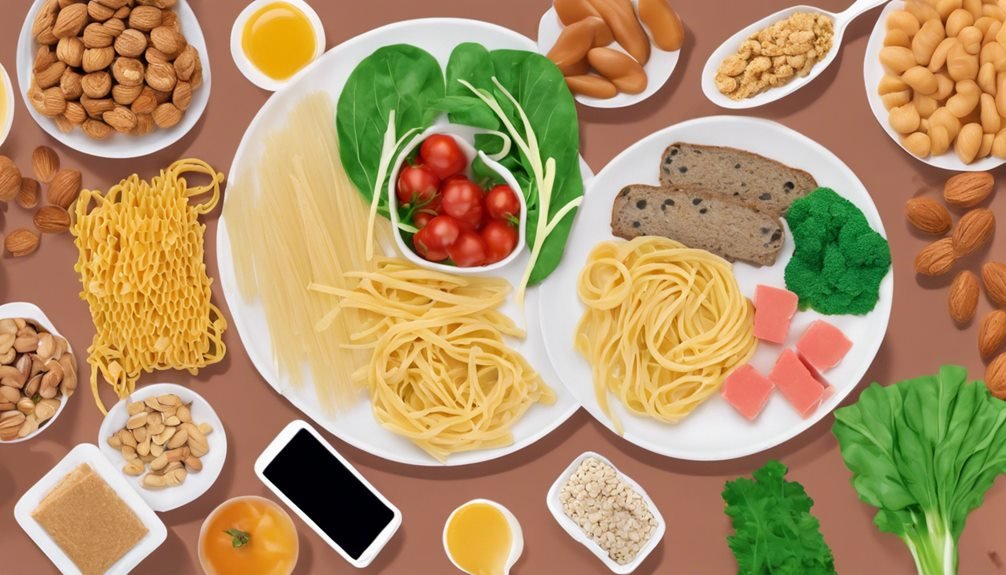
How does insulin play a role in the development and progression of cancer? Insulin is a hormone that helps regulate blood sugar levels in your body. However, when there's excess insulin due to a diet high in carbohydrates, it can lead to insulin resistance. This resistance can cause higher levels of insulin circulating in the blood, which may promote tumor growth and cancer progression.
Studies have shown that elevated insulin levels can stimulate the growth of certain types of cancer cells. Insulin can also affect other hormones and signaling pathways in the body that are involved in cell proliferation and tumor development. By controlling your insulin levels through a low-carb diet, you may reduce the risk of cancer development and progression.
Maintaining proper insulin regulation is essential for overall health and can play a crucial role in cancer prevention. By adopting a low-carb diet, you can help keep your insulin levels in check and potentially reduce the risk of cancer.
Ketogenic Diet Benefits
Embracing a ketogenic diet can offer a multitude of benefits beyond just weight management. When considering the impact on cancer prevention, this dietary approach can have significant advantages. Here are some key benefits to keep in mind:
- Ketosis Benefits: By following a ketogenic diet, your body shifts into a state of ketosis, where it burns fat for fuel instead of carbohydrates. This metabolic state has been linked to reduced inflammation and improved insulin sensitivity, both of which are crucial in cancer prevention.
- Cancer Metabolism: Cancer cells thrive on glucose, the primary fuel derived from carbohydrates. By limiting carbohydrate intake and increasing fat consumption in a ketogenic diet, you can potentially starve cancer cells, hindering their growth and proliferation.
- Improved Energy Levels: Many individuals on a ketogenic diet report increased energy and mental clarity, which can be beneficial for overall well-being and cancer prevention efforts.
- Enhanced Cellular Health: Ketogenic diets have been shown to promote autophagy, a cellular cleaning process that helps remove damaged components and maintain healthy cell function, potentially reducing the risk of cancer development.
Protein Intake Importance
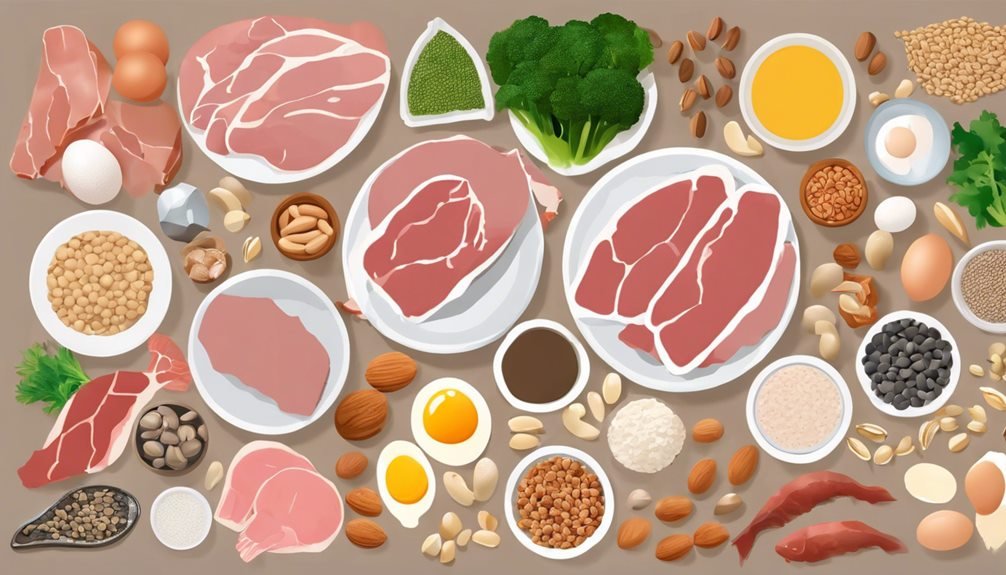
To understand the significance of protein intake in the context of cancer prevention, it's essential to recognize its pivotal role in maintaining overall health and supporting various physiological functions. Protein isn't only crucial for muscle building but also plays a vital role in the synthesis of essential molecules within the body.
When it comes to cancer prevention, adequate protein intake is necessary for supporting a healthy immune system, repairing damaged cells, and regulating cell growth and division.
Proteins are made up of amino acids, which are the building blocks of life. These amino acids are involved in numerous processes within the body, including supporting the immune response against cancer cells and aiding in DNA repair mechanisms.
Ensuring sufficient protein intake through sources like lean meats, fish, eggs, dairy, legumes, and nuts can help maintain muscle mass, promote overall health, and potentially reduce the risk of cancer development.
Prioritizing protein in your diet is a proactive step towards supporting your body's natural defense mechanisms and promoting overall well-being.
Healthy Fats in Cancer Prevention
Healthy fats play a crucial role in cancer prevention by providing essential nutrients and supporting various bodily functions. Incorporating healthy fats into your diet can significantly contribute to reducing the risk of cancer. Here are four reasons why healthy fats are essential for cancer prevention:
- Omega-3 Fatty Acids: Found in fish like salmon and flaxseeds, these fats have anti-inflammatory properties that can help lower the risk of cancer development.
- Antioxidants: Healthy fats such as those in avocados and olive oil contain antioxidants that protect cells from damage, potentially reducing the risk of cancer.
- Cell Membrane Support: Fats are crucial for the structure and function of cell membranes, which play a role in cell signaling and growth regulation, important aspects in preventing cancer.
- Hormone Regulation: Healthy fats are essential for hormone production and balance, influencing cell growth and division, which can impact cancer development positively.
Inflammation Reduction

Reducing inflammation is a key factor in cancer prevention. Low-carb diets have been shown to have anti-inflammatory properties, which can greatly benefit your overall health. By reducing inflammation, you are not only supporting your immune system but also creating an environment less conducive to cancer development.
Consider the following table to understand how specific foods in a low-carb diet can help reduce inflammation and support your immune system:
| Food | Benefits |
|---|---|
| Fatty Fish | Rich in omega-3 fatty acids that reduce inflammation and support immune function |
| Berries | Packed with antioxidants that combat inflammation and boost immune health |
| Leafy Greens | High in vitamins and minerals that help reduce inflammation and strengthen the immune system |
Incorporating these foods into your diet can help lower inflammation levels in your body, ultimately reducing your risk of cancer. By choosing a low-carb diet rich in these anti-inflammatory foods, you are actively supporting your body's defense mechanisms against diseases.
Impact on Cancer Cells
By influencing various metabolic pathways and signaling mechanisms, low-carb diets can exert a profound impact on cancer cells. Low-carb diets affect cancer cells by altering cellular metabolism and promoting apoptosis, which can hinder tumor growth and angiogenesis. Here are four key ways in which low-carb diets impact cancer cells:
- Cellular Metabolism: Low-carb diets can shift cancer cells away from utilizing glucose as their primary energy source, potentially impairing their ability to grow and divide rapidly.
- Apoptosis: These diets have been linked to promoting apoptosis, which is the natural process of programmed cell death, helping to eliminate damaged or abnormal cells, including cancerous ones.
- Tumor Growth: By disrupting the metabolic processes that fuel tumor growth, low-carb diets may slow down the proliferation of cancer cells and reduce the size of tumors.
- Angiogenesis: Low-carb diets may inhibit the formation of new blood vessels that supply nutrients to tumors, thereby limiting their ability to grow and spread.
Clinical Studies and Findings
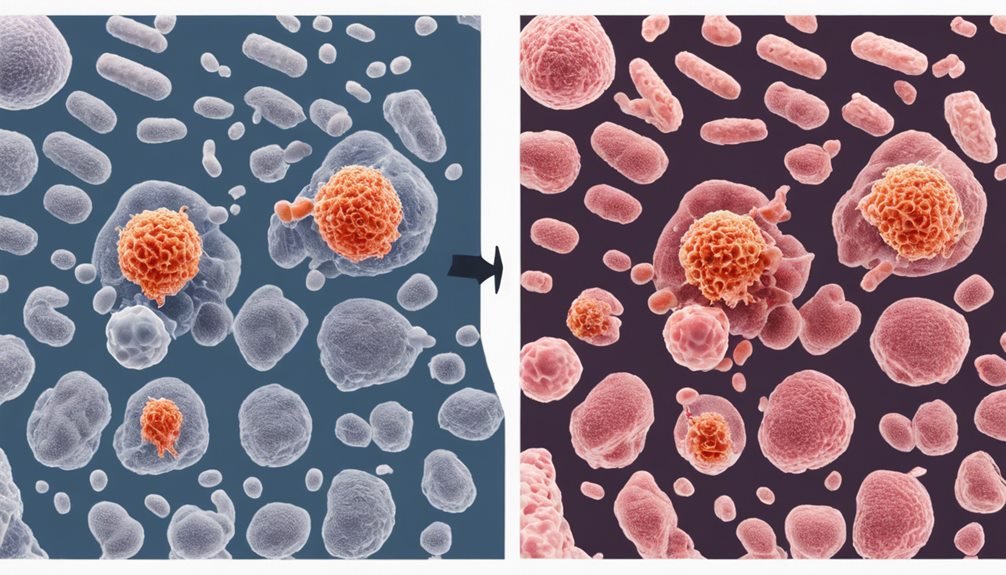
Numerous clinical studies have delved into the impact of low-carb diets on cancer prevention and treatment. Clinical trials and epidemiological evidence suggest that low-carb diets may have positive research implications in reducing the risk of certain types of cancer. By restricting carbohydrates, these diets can potentially help in controlling cancer growth and improving treatment outcomes.
Below is a table summarizing some key findings from recent studies:
| Study Title | Key Findings |
|---|---|
| Clinical Trial A | Reduced tumor growth in participants on low-carb diets |
| Epidemiological Study B | Lower incidence of breast cancer in low-carb diet followers |
| Clinical Trial C | Improved response to chemotherapy with low-carb diet support |
| Epidemiological Study D | Decreased risk of colon cancer with adherence to low-carb diets |
These results provide valuable insights that may influence future dietary guidelines for cancer prevention and treatment. Stay informed about the evolving research in this field to make informed decisions about your diet and lifestyle.
Dietary Recommendations for Prevention
Shifting focus to dietary recommendations for cancer prevention, understanding the impact of food choices on health becomes imperative. When aiming to prevent cancer, ensuring a diet rich in essential nutrients and plant-based options is crucial. Here are some key dietary recommendations to aid in cancer prevention:
- Nutrient Balance: Strive to maintain a balanced intake of macronutrients (carbohydrates, proteins, fats) as well as essential micronutrients (vitamins, minerals) to support overall health and potentially reduce cancer risk.
- Embrace Plant-Based Options: Incorporate a variety of fruits, vegetables, whole grains, nuts, seeds, and legumes into your diet. These plant-based options are packed with antioxidants, phytochemicals, and fiber, known for their potential protective effects against cancer.
- Limit Processed Foods: Reduce consumption of processed and high-sugar foods, as they may contribute to inflammation and oxidative stress, which are linked to cancer development.
- Stay Hydrated: Adequate hydration is essential for overall health, including maintaining proper cell function and aiding in digestion. Opt for water as the primary beverage choice over sugary drinks for optimal hydration and health benefits.
Potential Side Effects
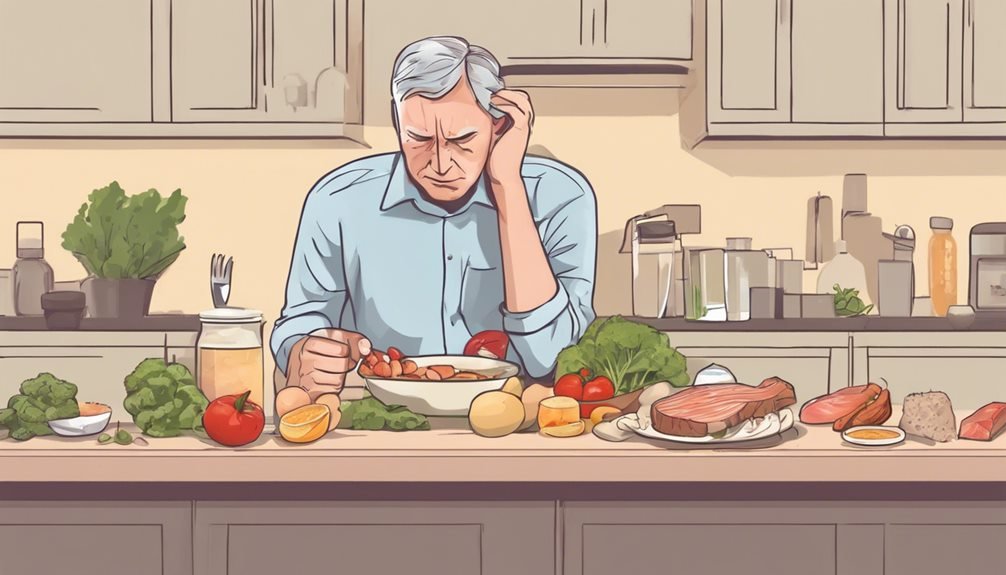
Potential side effects of dietary choices in relation to cancer prevention can vary depending on individual factors and adherence to recommended guidelines. When considering low-carb diets, it's crucial to be aware of potential nutrient deficiencies and dietary restrictions that may arise. Below is a table outlining possible side effects and ways to address them:
| Potential Side Effects | Ways to Address |
|---|---|
| Nutrient deficiencies | Ensure a well-rounded diet with a variety of vegetables, fruits, lean proteins, and healthy fats. Consider supplements if needed. |
| Dietary restrictions | Work with a healthcare provider or nutritionist to create a balanced meal plan that meets your nutritional needs while adhering to the low-carb guidelines. |
Implementing a Low-Carb Diet
When embarking on the journey of implementing a low-carb diet for cancer prevention, it's essential to approach this dietary change with a well-thought-out plan. Here are four key steps to help you seamlessly transition to a low-carb lifestyle:
- Meal Planning: Start by researching low-carb recipes and creating a weekly meal plan. This will help you stay organized and ensure you have nutritious meals readily available.
- Grocery Shopping: Make a list of low-carb staples such as lean proteins, non-starchy vegetables, and healthy fats before heading to the grocery store. This will prevent impulse purchases and keep you on track.
- Preparation is Key: Dedicate time to prep your meals in advance. Chop vegetables, marinate proteins, and portion out snacks to have healthy options on hand throughout the week.
- Stay Flexible: While planning is crucial, allow yourself some flexibility. Don't be too hard on yourself if you have occasional slip-ups. Focus on progress, not perfection, and adjust your plan as needed.
Frequently Asked Questions
Can a Low-Carb Diet Help in Managing Cancer Symptoms?
Yes, a low-carb diet can aid in managing cancer symptoms by providing nutritional support and aiding in weight management. By reducing carbohydrate intake, you may experience stabilized blood sugar levels and potentially promote a healthy weight, which can be beneficial in managing cancer symptoms. Consult with your healthcare provider to determine if a low-carb diet aligns with your overall treatment plan and individual health needs.
Are There Specific Types of Cancer That Benefit More From Low-Carb Diets?
When it comes to specific types of cancer, such as breast cancer and lung cancer, low-carb diets can potentially offer benefits. Studies suggest that reducing carbohydrate intake may have a positive impact on managing symptoms and improving outcomes for individuals with these types of cancer.
However, it's important to consult with healthcare professionals to determine the most suitable dietary approach as part of an overall treatment plan.
How Does Alcohol Consumption Affect the Effectiveness of a Low-Carb Diet for Cancer Prevention?
When considering the impact of alcohol consumption on the effectiveness of a low-carb diet for cancer prevention, moderation is key.
Excessive alcohol intake can hinder the benefits of a low-carb diet by increasing inflammation and oxidative stress, factors linked to cancer development.
To maximize the effectiveness of your low-carb diet in cancer prevention, it's advisable to limit alcohol consumption and focus on nutrient-dense foods that support overall health and well-being.
Can a Low-Carb Diet Be Combined With Traditional Cancer Treatments?
Yes, you can combine a low-carb diet with traditional cancer treatments. Studies show that integrating dietary supplements, such as vitamins and minerals, can support your body during treatment. Additionally, maintaining a light exercise routine can improve your overall well-being and energy levels.
Always consult with your healthcare team to ensure that your low-carb diet complements your treatment plan effectively. Your commitment to a balanced approach can enhance your cancer journey.
Are There Any Age Restrictions for Following a Low-Carb Diet for Cancer Prevention?
For individuals of all ages considering a low-carb diet for cancer prevention, keep in mind that it's crucial to consult with a healthcare provider or a nutritionist. While childhood obesity and elderly nutrition are important factors to consider, there are typically no strict age restrictions for adopting a low-carb diet. However, personalized guidance is key to ensure that the dietary changes align with the individual's specific health needs and goals.
Conclusion
In conclusion, low-carb diets are a powerhouse in the fight against cancer, offering a potent weapon to starve cancer cells and reduce the risk of tumor growth. By focusing on protein-rich foods and healthy fats, these diets help control insulin levels and inflammation, supporting overall health and well-being. Embrace the power of low-carb eating to supercharge your cancer prevention efforts and take control of your health like never before.
